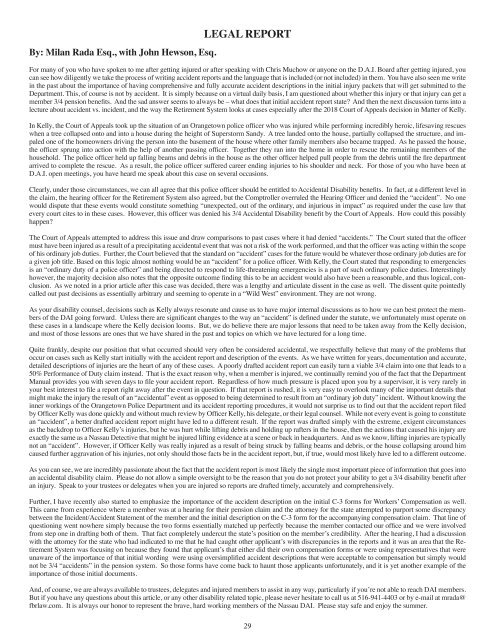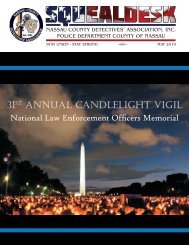SquealDeskMay2019proof4-compressed
Create successful ePaper yourself
Turn your PDF publications into a flip-book with our unique Google optimized e-Paper software.
By: Milan Rada Esq., with John Hewson, Esq.<br />
LEGAL REPORT<br />
For many of you who have spoken to me after getting injured or after speaking with Chris Muchow or anyone on the D.A.I. Board after getting injured, you<br />
can see how diligently we take the process of writing accident reports and the language that is included (or not included) in them. You have also seen me write<br />
in the past about the importance of having comprehensive and fully accurate accident descriptions in the initial injury packets that will get submitted to the<br />
Department. This, of course is not by accident. It is simply because on a virtual daily basis, I am questioned about whether this injury or that injury can get a<br />
member 3/4 pension benefits. And the sad answer seems to always be – what does that initial accident report state? And then the next discussion turns into a<br />
lecture about accident vs. incident, and the way the Retirement System looks at cases especially after the 2018 Court of Appeals decision in Matter of Kelly.<br />
In Kelly, the Court of Appeals took up the situation of an Orangetown police officer who was injured while performing incredibly heroic, lifesaving rescues<br />
when a tree collapsed onto and into a house during the height of Superstorm Sandy. A tree landed onto the house, partially collapsed the structure, and impaled<br />
one of the homeowners driving the person into the basement of the house where other family members also became trapped. As he passed the house,<br />
the officer sprung into action with the help of another passing officer. Together they ran into the home in order to rescue the remaining members of the<br />
household. The police officer held up falling beams and debris in the house as the other officer helped pull people from the debris until the fire department<br />
arrived to complete the rescue. As a result, the police officer suffered career ending injuries to his shoulder and neck. For those of you who have been at<br />
D.A.I. open meetings, you have heard me speak about this case on several occasions.<br />
Clearly, under those circumstances, we can all agree that this police officer should be entitled to Accidental Disability benefits. In fact, at a different level in<br />
the claim, the hearing officer for the Retirement System also agreed, but the Comptroller overruled the Hearing Officer and denied the “accident”. No one<br />
would dispute that these events would constitute something “unexpected, out of the ordinary, and injurious in impact” as required under the case law that<br />
every court cites to in these cases. However, this officer was denied his 3/4 Accidental Disability benefit by the Court of Appeals. How could this possibly<br />
happen?<br />
The Court of Appeals attempted to address this issue and draw comparisons to past cases where it had denied “accidents.” The Court stated that the officer<br />
must have been injured as a result of a precipitating accidental event that was not a risk of the work performed, and that the officer was acting within the scope<br />
of his ordinary job duties. Further, the Court believed that the standard on “accident” cases for the future would be whatever those ordinary job duties are for<br />
a given job title. Based on this logic almost nothing would be an “accident” for a police officer. With Kelly, the Court stated that responding to emergencies<br />
is an “ordinary duty of a police officer” and being directed to respond to life-threatening emergencies is a part of such ordinary police duties. Interestingly<br />
however, the majority decision also notes that the opposite outcome finding this to be an accident would also have been a reasonable, and thus logical, conclusion.<br />
As we noted in a prior article after this case was decided, there was a lengthy and articulate dissent in the case as well. The dissent quite pointedly<br />
called out past decisions as essentially arbitrary and seeming to operate in a “Wild West” environment. They are not wrong.<br />
As your disability counsel, decisions such as Kelly always resonate and cause us to have major internal discussions as to how we can best protect the members<br />
of the DAI going forward. Unless there are significant changes to the way an “accident” is defined under the statute, we unfortunately must operate on<br />
these cases in a landscape where the Kelly decision looms. But, we do believe there are major lessons that need to be taken away from the Kelly decision,<br />
and most of those lessons are ones that we have shared in the past and topics on which we have lectured for a long time.<br />
Quite frankly, despite our position that what occurred should very often be considered accidental, we respectfully believe that many of the problems that<br />
occur on cases such as Kelly start initially with the accident report and description of the events. As we have written for years, documentation and accurate,<br />
detailed descriptions of injuries are the heart of any of these cases. A poorly drafted accident report can easily turn a viable 3/4 claim into one that leads to a<br />
50% Performance of Duty claim instead. That is the exact reason why, when a member is injured, we continually remind you of the fact that the Department<br />
Manual provides you with seven days to file your accident report. Regardless of how much pressure is placed upon you by a supervisor, it is very rarely in<br />
your best interest to file a report right away after the event in question. If that report is rushed, it is very easy to overlook many of the important details that<br />
might make the injury the result of an “accidental” event as opposed to being determined to result from an “ordinary job duty” incident. Without knowing the<br />
inner workings of the Orangetown Police Department and its accident reporting procedures, it would not surprise us to find out that the accident report filed<br />
by Officer Kelly was done quickly and without much review by Officer Kelly, his delegate, or their legal counsel. While not every event is going to constitute<br />
an “accident”, a better drafted accident report might have led to a different result. If the report was drafted simply with the extreme, exigent circumstances<br />
as the backdrop to Officer Kelly’s injuries, but he was hurt while lifting debris and holding up rafters in the house, then the actions that caused his injury are<br />
exactly the same as a Nassau Detective that might be injured lifting evidence at a scene or back in headquarters. And as we know, lifting injuries are typically<br />
not an “accident”. However, if Officer Kelly was really injured as a result of being struck by falling beams and debris, or the house collapsing around him<br />
caused further aggravation of his injuries, not only should those facts be in the accident report, but, if true, would most likely have led to a different outcome.<br />
As you can see, we are incredibly passionate about the fact that the accident report is most likely the single most important piece of information that goes into<br />
an accidental disability claim. Please do not allow a simple oversight to be the reason that you do not protect your ability to get a 3/4 disability benefit after<br />
an injury. Speak to your trustees or delegates when you are injured so reports are drafted timely, accurately and comprehensively.<br />
Further, I have recently also started to emphasize the importance of the accident description on the initial C-3 forms for Workers’ Compensation as well.<br />
This came from experience where a member was at a hearing for their pension claim and the attorney for the state attempted to purport some discrepancy<br />
between the Incident/Accident Statement of the member and the initial description on the C-3 form for the accompanying compensation claim. That line of<br />
questioning went nowhere simply because the two forms essentially matched up perfectly because the member contacted our office and we were involved<br />
from step one in drafting both of them. That fact completely undercut the state’s position on the member’s credibility. After the hearing, I had a discussion<br />
with the attorney for the state who had indicated to me that he had caught other applicant’s with discrepancies in the reports and it was an area that the Retirement<br />
System was focusing on because they found that applicant’s that either did their own compensation forms or were using representatives that were<br />
unaware of the importance of that initial wording were using oversimplified accident descriptions that were acceptable to compensation but simply would<br />
not be 3/4 “accidents” in the pension system. So those forms have come back to haunt those applicants unfortunately, and it is yet another example of the<br />
importance of those initial documents.<br />
And, of course, we are always available to trustees, delegates and injured members to assist in any way, particularly if you’re not able to reach DAI members.<br />
But if you have any questions about this article, or any other disability related topic, please never hesitate to call us at 516-941-4403 or by e-mail at mrada@<br />
fbrlaw.com. It is always our honor to represent the brave, hard working members of the Nassau DAI. Please stay safe and enjoy the summer.<br />
29



